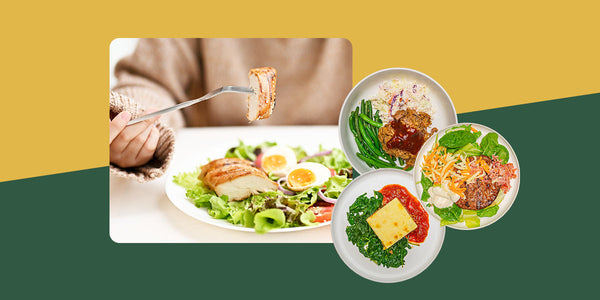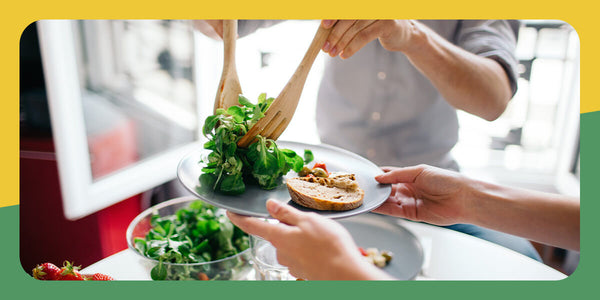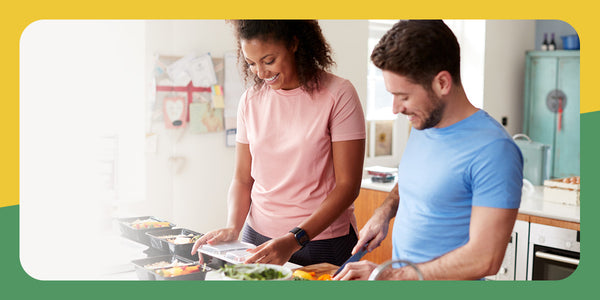Meal prep is an excellent way to fill your plate with delicious and nutritious meals that save you time and money throughout the week.
Meal prepping can help you reach your lifestyle goals by ensuring you eat wholesome and balanced meals that keep you satisfied, full and energized throughout the day and the week ahead.
There are many ways to meal prep, and this method of food preparation can be simple and effective. You can find tons of exciting and flavorful meals that you love and add variety to your everyday diet.
You can tailor them by finding recipes that meet your vegan, vegetarian or keto dietary needs.
Check out our meal prepping guide to discover meal prep basics, basic food prep and interesting meal prep ideas to keep you full and satisfied.

What Is Meal Prepping?
Meal prep involves preparing nutritious meals ahead of schedule so you can eat them when you need them. Meal prepping can help you learn portion control and save you tons of time in the kitchen and grocery store.
This method is beneficial for those trying to reach nutrition or weight loss goals, and it can prevent you from ordering takeout or reaching for unhealthy snacks when you're tired or overwhelmed.
Learning how to meal prep can be simple. There are multiple ways to meal prep, and the best method is whatever works best for your schedule. Some people enjoy meal prepping breakfast to ensure they start their day on the right foot.
Others prefer to plan their dinners to spend more time doing what they love in the evening. Some people enjoy meal prepping over the weekends while others prepare a day's meal a few nights before.

The Benefits of Meal Prepping
Before learning how to get into meal prepping, know what meal plans can do for you. There are many benefits of meal prepping, including:
- Saving time: Meal prepping can save you time later in the week. Whether you need more time in the morning or want to spend less time in the kitchen during the evenings, meal prepping is the way to go.
- Reducing stress: Cooking can be enjoyable, but not when you're unsure what to eat. Meal prep is an excellent way to eliminate these decisions and ensure you fill your plate with wholesome foods you'll love.
- Saving money: When you effectively meal prep, you can reduce the time and money you spend in the grocery store by ensuring you buy the foods that will keep you full all week.
- Providing an eating routine: Create the schedule that best fits your needs by meal prepping. You can ensure you always eat nutritious meals at your scheduled time to stay energized throughout the day.
- Simplifying portion control: You can find meal prep containers that let you portion your foods and ensure you're getting the proper amount of every food group to stay healthy and reach your lifestyle goals.
- Reducing food waste: The dishes you create will help you reduce food waste by preparing the portions you need for every meal. You can eliminate the guesswork when cooking and ensure you don't have leftovers to toss out later.
How to Start Meal Prepping
Meal prepping for beginners can seem challenging, but it's rather simple. To begin, you need to gather materials that will simplify your cooking, storing and eating.
You'll need to craft a schedule that works for you and find meals that will satisfy your hunger while being able to hold up in the fridge.
What Kitchen Equipment Do You Need to Meal Prep?
Finding the proper containers will aid in the meal prep process. You'll want to find something reusable and, preferably, something that is dishwasher safe, can go in the freezer and microwave and is free of any harmful chemicals or products.
Some meal prep containers have sections inside, making them perfect for portion control. However, some people enjoy finding various container sizes and shapes to store their food.
For instance, you may decide to buy a large, open container for a salad and pair it with a tiny square container for your dressing to keep the lettuce from getting soggy. Find whatever will fit your lunch box or take up a small amount of space in the fridge.
Some other cooking equipment you might need includes:
- Instant Pot
- Spiralizer
- Food processor
- Measuring cups and spoons
- Muffin tins
- Mason jars
- Casserole dishes
- Food scale
- Loaf pan
- Baking sheets
How Many Days Should I Meal Prep For?
After you get all the utensils and cooking equipment you need, your next step is to determine the schedule that will work best for you and how many days you plan to meal prep.
Generally, you will want to meal plan for three to five days, but you can meal prep for seven days if you freeze some of your food. The food you use will determine how far in advance you can prep to have fresh and nutritious dishes during each meal.
Some foods will last longer than others, so you must be careful what ingredients you use to craft your meals.
If your goal is to have one meal prepared for each day of the work week, you'll likely want to tailor your meals to accommodate your needs or plan to meal prep twice throughout the week.
How Long Do Meal Preps Last?
The foods you choose and how you store them will be essential in how long the meal preps will last. The quality of your ingredients, how tightly you pack your meals and the kind of container you use will also impact how long your meals are good for.
Your storing method is something to consider if you plan to prep for a whole week. In the fridge, meals can last a few days, but they can last much longer if you freeze them.
Some foods will have varying durations depending on how you cook them. For example, smoked fish can last up to two weeks in the fridge, while cooked fish lasts only three to four days.
As a general rule of thumb, assume your meal prep will last only as long as the ingredient with the shortest life span in your dish. If you're concerned about the quality of your food, check these indicators before eating:
- Color: Your meals should look how they did after you prepped them. Brown lettuce or gray meat indicates it's time to toss the dish.
- Texture: Avoid slimy and limp food to ensure you don't consume any unwanted bacteria.
- Smell: You want each meal prep to smell the same as when you first made it. If anything smells off, assume it isn't good to eat anymore.
- Mold: We've all forgotten that loaf of bread in the pantry or leftovers we pushed to the back of the fridge. If you see any signs of mold, immediately dispose of the food.
You can also refer to the cold storage safety chart from FoodSafety.gov or print it out to keep on your fridge as a handy guide for how long foods like meats and eggs last.
Remember, you'll learn to nail your routine as you practice. As you experiment with new recipes and determine the best schedule, you'll discover which foods last longer than others and how many dishes you can make at a time.
Everyone forgets things sometimes, so let any mistakes you make in the kitchen serve as a jumping-off point for your next round of dishes. Soon, you'll be crafting fresh and mouthwatering meals every time you step into the kitchen.

What Should My Meals Look Like?
Your meal plan menu should comprise delicious and nutritious foods that make you feel good and help you stay energized throughout the day. You'll want a colorful diet that you feel excited to eat whenever you sit at the table.
Start small by creating a working formula. One week you may want to incorporate a protein, vegetable and starch, while the second week, you may want to eat a protein, grain and vegetable.
You will also want to include healthy fats like avocado, olive or coconut oil. Perhaps you cook chicken in olive oil and pair it with rice and broccoli for one meal. For another meal, you might want eggs, peppers and oats.
You should also evaluate your activity level if you're trying to control your weight through meal planning.
If you're working out moderately or want to maintain weight, fill your meals with 50% fruits and veggies, 25% protein and 25% starches. If you want to gain muscle or participate in heavy training, try to meal prep dishes that are even with fruits and veggies, protein and starches.
What Foods Are Good to Meal Prep?
Once you craft your schedule and know how to fill your plate, it's time to get to the fun part — cooking the meals.
When you find new meal prep ideas, take a second to write them down and curate a grocery list, so you can get all the ingredients you need.
Keep in mind which foods are best for meal prepping and which you should avoid, ensuring you always create fresh, nutritious and delicious meals every time.
Good Foods to Meal Prep
From snacks to sit-down dinners, you can use many excellent ingredients for meal prep. The best foods to meal prep will stay fresh until you can eat them, help you stay away from snacking and ensure you don't go hungry throughout the day.
Veggies
Some of the best foods to meal prep with are vegetables. You can eat them raw, steamed, baked and in various other ways. Add these vegetables to your grocery list:
- Beans
- Chickpeas
- Lentils
- Carrots
- Celery
- Spaghetti squash
- Peppers
- Broccoli
- Spinach
- Lettuce
- Green beans
- Kale
- Asparagus
- Mushrooms
- Radishes
Fruits
Fruit can be challenging to meal prep for multiple days in advance. Some become watery or turn brown too quickly to enjoy for more than three or four days. Here are some fruits you can prep that last longer than others:
- Bananas
- Oranges
- Kiwi
- Pineapple
- Plum
- Melons
- Blueberries
Protein
You should always have some protein in your diet because these foods help to curb hunger, repair your body and support the building blocks of muscles, skin and bones. Incorporate some of these protein sources:
- Eggs
- Chicken
- Ground turkey
- Ground beef
- Steak
- Salmon
- Shrimp
- Almonds
- Walnuts
- Macadamia nuts
- Peanuts
- Chia seeds
- Pumpkin seeds
- Sunflower seeds
- Tuna
- Sardines
- Tofu
- Sausage
Carbs
Carbohydrates are your main source of energy. Many fad diets and quick fixes recommend cutting carbs, but your body needs these to support your daily life.
Rather than eliminate these foods, you can look for healthier alternatives and eat them in moderation. For example, you can swap your white flour for a better alternative, like almond or coconut flour. Good carbohydrates for meal prep include:
- Rolled oats
- Quinoa
- Brown rice
- Whole grain pasta
- Whole grain cereal
- Potatoes
- Whole wheat bread
Foods to Avoid Meal Prepping
Although there are tons of tasty foods you can use to meal prep, there are also many you want to avoid.
Foods that don't refrigerate well or lose taste or texture when you reheat them are not good picks for meal preps. Steer clear of incorporating these foods and look for better alternatives if you want to emulate a dish you love:
- Chicken with skin
- Avocados
- Yogurt
- Crispy meats
- Dressing on salads
- Juicy fruits
There are some ways you can use some of these ingredients or substitute them to prevent food waste. For instance, you can chop avocado at mealtime to avoid it going brown and still save time in the kitchen.
You can still have a crispy chicken dish by adding crackers to your meal. Or, keep your salad fresh by storing your dressing separately and pouring it when needed.
Example Menu for the Week
Now that you're becoming a meal prep master, you're ready to experiment in the kitchen. Crafting a mouthwatering menu is what meal prep is all about. If you need some ideas, we've got you covered.
Pull one recipe from each category and fill your day with delectable dishes all week long, or pull a few and switch things up every couple of days.
For breakfast, you could have:
- Eggs, sausage, toast and potatoes
- Cheesy eggs, bacon and berry compote
- Blueberry french toast and turkey sausage
- Vanilla macadamia pancakes
You can find tons of recipes for your midday meal, including keto, vegan, vegetarian and paleo lunch recipes. Try some of these for lunch:
- Greek salad with chicken
- Bison sliders with sweet potato fries
- Grilled chicken quinoa bowl
- Pork bowl with black beans and rice
Many people enjoy chowing down for dinner. To ensure you have a full plate that satisfies you for the rest of the day, try some of these dinners:
- Chicken lo mein with red curry dressing
- Turkey chili
- Shrimp and pasta
- Spaghetti squash chicken Alfredo

Meal Prep Made Easy: Fresh Meal Plan's Chef-Prepared Meal Subscription
With Fresh Meal Plan, you can go from a meal prep beginner to a master in the kitchen. We deliver freshly crafted meals right to your table.
We've stocked our kitchen with innovation and quality by having the best chefs join our team. Each of our meals uses locally sourced and fresh ingredients, so you can always eat meals that come from the earth.
When you meal prep with us, you can gain access to hundreds of meals that you can prepare within three minutes or less. Eliminate your time in the grocery store and save money on shopping by selecting a Fresh Meal Plan that fits your lifestyle.
Plus, you can store our meals for up to 10 days unopened, so you can switch your meals and tailor your plan to your busy life.
We believe eating healthy should be easy, which is why we provide fresh, high-quality meals for everyone.
You can choose from hundreds of meals on our weekly menu to keep things interesting and ensure your plate is full of the food you love. Get started with Fresh Meal Plan and become a meal prep master in no time.





